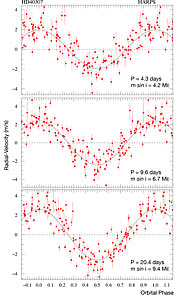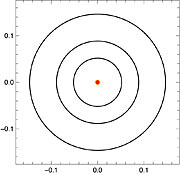Tisková zpráva
Nalezena trojice superzemí
Přístroj HARPS přinesl bohatou úrodu exoplanet s nízkou hmotností
16. června 2008
Tým evropských astronomů ohlásil na mezinárodní konferenci významný objev na poli exoplanetárního průzkumu. Pomocí přístroje HARPS na observatoři ESO v La Silla nalezl v okolí hvězdy HD 40307 systém tří superzemí. Pozorování přístrojem HARPS ve sledovaném vzorku hvězd navíc odhalilo dalších 45 kandidátů na exoplanety s hmotností menší než je třicetinásobek hmotnosti Země a s oběžnou dobou kratší než 50 dní, tzn. že okolo každé třetí našemu Slunci podobné hvězdy obíhá planeta s výše uvedenými parametry.
„Obíhají snad okolo každé hvězdy planety? A pokud ano, kolik jich tam je?“ podivuje se lovec planet Michel Mayor z observatoře v Ženevě. „Přestože na tuto otázku stále ještě neznáme odpověď, učinili jsme významný krok vpřed k jejímu zodpovězení.“ Od roku 1995, kdy byla Michelem Mayorem a Didierem Quelozem objevena planeta obíhající kolem hvězdy 51 Pegasi, již bylo nalezeno více jak 270 exoplanet, obíhajících kolem Slunci podobných hvězd. Většina těchto planet jsou plynní obři, podobní Saturnu či Jupiteru. Ze statistik vyplývá, že takováto planeta obíhá kolem každé čtrnácté hvězdy.
„S příchodem mnohem přesnějších přístrojů, mezi které patří také spektrograf HARPS na 3.6 m dalekohledu ESO v La Silla, můžeme objevit i menší planety s hmotností mezi 2-10 hmotnostmi Země,“ říká Stéphane Udry, jeden z Mayorových kolegů. Takové planety nazýváme superzemě. Hmotnost superzemě je větší než hmotnost Země, ale menší než hmotnost planety Uran či Neptun (tj. okolo 15násobku hmotnosti Země).
Astronomové nyní objevili systém složený ze tří superzemí, obíhajících okolo hvězdy, jež je jen o málo hmotnější než Slunce. Tato hvězda je vzdálena 42 světelných let a nachází se na rozhraní souhvězdí Mečouna a Malíře (latinsky Doradus a Pictor). „Během posledních pěti let jsme prováděli velmi pečlivá měření radiální rychlosti hvězdy HD40307, která jasně ukázala přítomnost trojice planet v tomto systému,“ říká Mayor. Planety jsou 4,2; 6,7 a 9,4krát hmotnější než Země a okolo hvězdy obíhají s periodami 4,3; 9,6 a 20,4 dne.
„Změny radiální rychlosti hvězdy způsobené planetami jsou velice malé. Vždyť nejmenší planeta je stotisíckrát lehčí než její mateřská hvězda. Takové odchylky je možné zaznamenat pouze pomocí velice citlivého přístroje, jako je např. HARPS,“ říká spoluautor François Bouchy z Institut d'Astrophysique de Paris. Změna radiální rychlosti hvězdy, způsobená planetou, činí jen několik metrů za sekundu.
Na stejné konferenci byl také ohlášen objev dalších dvou planetárních soustav, učiněný pomocí spektrografu HARPS. V prvním systému obíhá kolem hvězdy HD 181433 superzemě (7,5 hmotnosti Země) s periodou 9,5 dne, a také planeta podobná Jupiteru s oběžnou dobou 3 roky. Druhý systém obsahuje planetu s oběžnou dobou 4 dny (22 hmotností Země) a Saturnu podobného plynného obra s periodou oběhu 3 roky. „Uvedené planety jsou (jistě) pouze špičkou ledovce,“ říká Mayor. „Po vyhodnocení dat naměřených u všech hvězd nám HARPS ukázal, že okolo jedné třetiny ze všech Slunci podobných hvězd obíhá buď superzemě nebo planeta podobná Neptunu s oběžnou dobou menší než 50 dní.“
Je mnohem snazší nalézt planety s krátkou dobou oběhu než ty na vzdálených drahách s dlouhými periodami. „Je velmi pravděpodobné, že kolem hvězd neobíhají jenom superzemě, ale také planety s hmotností podobnou Zemi. Ty však zatím nejsme schopni objevit. Když k tomuto předpokladu přidáme již známé exoplanety podobné Jupiteru, můžeme snadno dojít k závěru, že planety jsou vlastně všude,“ uzavírá Udry.
Další informace
These discoveries have been announced today at the international conference "Extra-solar Super-Earths" which takes place in Nantes, France, from 16 to 18 June.
Two papers on these discoveries have also been submitted to the research journal Astronomy & Astrophysics
The team is composed of Michel Mayor, Stéphane Udry, Didier Queloz, Christophe Lovis, and Francesco Pepe (Geneva Observatory, Geneva University, Switzerland), François Bouchy (Institut d'Astrophysique de Paris, France), Willy Benz and Christophe Mordasini (Physikalisches Institut, Bern University, Switzerland), and Jean-Loup Bertaux (Service d'aéronomie du CNRS, Université de Versailles Saint-Quentin, France).
Kontakty
Didier Queloz
Observatory of Geneva University
Geneva, Switzerland
Tel.: +41 22 379 22 00
Email: Didier.Queloz@obs.unige.ch
Stéphane Udry
Observatory of Geneva University
Geneva, Switzerland
Tel.: +41 22 379 22 00
Email: Stephane.Udry@obs.unige.ch
Michel Mayor
Observatory of Geneva University
Geneva, Switzerland
Email: Michel.Mayor@obs.unige.ch
François Bouchy
Institut d'Astrophysique de Paris
Paris, Paris
Tel.: +33 1 44 32 8079
Email: bouchy@iap.fr
Anežka Srbljanović (press contact Česko)
ESO Science Outreach Network
a Astronomical Institute of Czech Academy of Sciences
Tel.: +420 323 620 116
Email: eson-czech@eso.org
O zprávě
| Tiskové zpráva č.: | eso0819cs |
| Legacy ID: | PR 19/08 |
| Jméno: | HD 40307 |
| Typ: | Milky Way : Star : Evolutionary Stage : Main Sequence Milky Way : Star : Circumstellar Material : Planetary System |
| Facility: | ESO 3.6-metre telescope |
| Instruments: | HARPS |
| Science data: | 2009A&A...496..513M 2009A&A...493..645F 2009A&A...493..639M |



